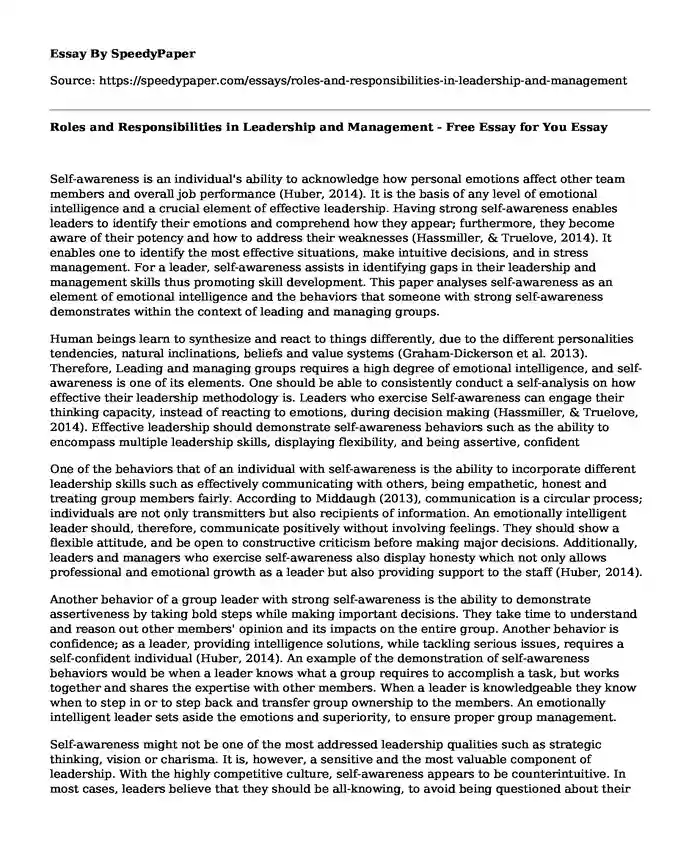
| Type of paper: | Essay |
| Categories: | Leadership analysis Management |
| Pages: | 3 |
| Wordcount: | 619 words |
Self-awareness is an individual's ability to acknowledge how personal emotions affect other team members and overall job performance (Huber, 2014). It is the basis of any level of emotional intelligence and a crucial element of effective leadership. Having strong self-awareness enables leaders to identify their emotions and comprehend how they appear; furthermore, they become aware of their potency and how to address their weaknesses (Hassmiller, & Truelove, 2014). It enables one to identify the most effective situations, make intuitive decisions, and in stress management. For a leader, self-awareness assists in identifying gaps in their leadership and management skills thus promoting skill development. This paper analyses self-awareness as an element of emotional intelligence and the behaviors that someone with strong self-awareness demonstrates within the context of leading and managing groups.
Human beings learn to synthesize and react to things differently, due to the different personalities tendencies, natural inclinations, beliefs and value systems (Graham-Dickerson et al. 2013). Therefore, Leading and managing groups requires a high degree of emotional intelligence, and self-awareness is one of its elements. One should be able to consistently conduct a self-analysis on how effective their leadership methodology is. Leaders who exercise Self-awareness can engage their thinking capacity, instead of reacting to emotions, during decision making (Hassmiller, & Truelove, 2014). Effective leadership should demonstrate self-awareness behaviors such as the ability to encompass multiple leadership skills, displaying flexibility, and being assertive, confident
One of the behaviors that of an individual with self-awareness is the ability to incorporate different leadership skills such as effectively communicating with others, being empathetic, honest and treating group members fairly. According to Middaugh (2013), communication is a circular process; individuals are not only transmitters but also recipients of information. An emotionally intelligent leader should, therefore, communicate positively without involving feelings. They should show a flexible attitude, and be open to constructive criticism before making major decisions. Additionally, leaders and managers who exercise self-awareness also display honesty which not only allows professional and emotional growth as a leader but also providing support to the staff (Huber, 2014).
Another behavior of a group leader with strong self-awareness is the ability to demonstrate assertiveness by taking bold steps while making important decisions. They take time to understand and reason out other members' opinion and its impacts on the entire group. Another behavior is confidence; as a leader, providing intelligence solutions, while tackling serious issues, requires a self-confident individual (Huber, 2014). An example of the demonstration of self-awareness behaviors would be when a leader knows what a group requires to accomplish a task, but works together and shares the expertise with other members. When a leader is knowledgeable they know when to step in or to step back and transfer group ownership to the members. An emotionally intelligent leader sets aside the emotions and superiority, to ensure proper group management.
Self-awareness might not be one of the most addressed leadership qualities such as strategic thinking, vision or charisma. It is, however, a sensitive and the most valuable component of leadership. With the highly competitive culture, self-awareness appears to be counterintuitive. In most cases, leaders believe that they should be all-knowing, to avoid being questioned about their abilities. However, self-awareness proposes that effective leadership and management requires an understanding of attitudes and being open to not only innovative and creative opinions but also constructive criticism.
References
Graham-Dickerson, P., Houser, J., Thomas, E., Casper, C., ErkenBrack, L., Wenzel, M., & Siegrist, M. (2013). The value of staff nurse involvement in decision making. Journal of Nursing Administration, 43(5), 286-292.
Hassmiller, S. B., & Truelove, J. (2014). Are you the best leader you can be?. The American journal of nursing, 114(1), 61-61.Huber, D. (2014). Leadership and Nursing Care Management. Elsevier Health Sciences.
Middaugh, D. J. (2013). Signal-to-noise ratio: filtering out ineffective communication. Medsurg Nursing, 22(4), 262.
Cite this page
Roles and Responsibilities in Leadership and Management - Free Essay for You. (2022, May 26). Retrieved from https://speedypaper.com/essays/roles-and-responsibilities-in-leadership-and-management
Request Removal
If you are the original author of this essay and no longer wish to have it published on the SpeedyPaper website, please click below to request its removal:
- A Cultural Theme in The Spirit Catches You, And You Fall Book
- Application Questions. Education Essay Example.
- The Development of the Human and Technology. Essay Sample.
- Essay Example for Free on How Evolution Has Shaped Modern Life
- Website Analysis Assignment, Free Sample
- Free Essay on Texas Gun Laws
- Free Essay Sample - Cloud Storage
Popular categories




